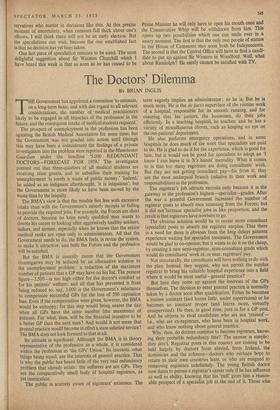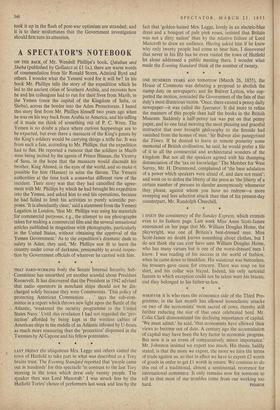The Doctors' Dilemma
BY BRIAN INGLIS HE Government has appointed a committee 'to estimate. on a long-term basis, and with due regard to all relevant considerations, the number of medical practitioners likely to be engaged in all branches of the profession in the future, and the consequent intake of medical students required.'
The prospect of unemployment in the profession has been agitating the British Medical Association for some time; but the Government was not goaded into action until (though this may have been a coincidence) the findings of a private investigation into the problem were reported in the Manchester Guardian under the headline '5,000 REDUNDANT DOCTORS—FORECAST FOR 1959.' The investigator pointed out that three-quarters of all medical students are receiving state grants, and to subsidise their training for unemployment 'is surely a waste of public money.' Indeed,' he added as an indignant afterthought. 'it is iniquitous': but the Government is more likely to have been moved by the waste than by the iniquity.
The BMA's view is that the trouble lies less with excessive intake than with the Government's miserly myopia in failing to provide the required jobs. For example, the Forces are short of doctors, because no keen newly qualified man wants to devote his career to looking after aggressively healthy soldiers, sailors, and airmen, especially when he knows that the senior medical ranks are open only to administrators. All that the Government needs to do, the BMA feels, is revise the system, to make it attractive; and both the Forces and the profession will be.satisfied. term vaguely implies an administrator: so he is. But he is much more. He is the de facto supervisor of the routine work of a hospital, responsible for its smooth running, and for ensuring that his juniors, the housemen, do their jobs efficiently. In a teaching hospital, he teaches; and he has a variety of miscellaneous chores, such as keeping an eye on the out-patients' department.
He also performs emergency operations, and in some hospitals he does much of the work that specialists are paid to do. He is glad to do it for the experience, which is good for him; but it would not be good for specialists to adopt an 'I know I can leave it in X's hands' mentality. What it comes to is that too many registrars are doing consultants' work. But they are not getting consultant pay—far from it; they are the most underpaid branch (relative to their work and responsibilities) in the profession.
The registrar's job attracts recruits only because it is the gateway to the profession's highest—specialist—grades. After the war a grateful Government increased the number of registrar posts to absorb men returning from the Forces; but it did noeincrease specialist jobs in like proportion, and the result is that registrars have nowhere to go.
The obvious solution would be to create more consultant (specialist) posts to absorb the registrar surplus. That there is a need for them is obvious from the long delays patients experience waiting for specialist treatment. The Government would be glad to co-operate; but it wants to do it on the cheap, by creating a new semi-registrar, semi-consultant grade which would do consultants' work at, or near, registrars' pay.
Not unnaturally, the consultants will have nothing to do with the plan. Instead, they suggest, why not permit the surplus registrar to bring his valuable hospital experience into a field where it would be most useful—general practice?
But here they come up against the interests of the GPs themselves. The decision to enter general practice is normally taken by a doctor soon after qualification. Either he becomes a trainee assistant (and learns little, under supervision) or he becomes an assistant proper (and learns more, virtually unsupervised). He then, in good time, puts in for a GP post. And he objects to rival candidates who are not 'trained'- i.e., who are ex-registrars, who have been in hospital work, and who know nothing about general practice.
Why, then, do doctors continue to become registrars, know- ing their probable redundancy fate? The answer is simple: they don't. Registrar posts in this country are coming to be held largely by doctors from abroad, from Ireland, the dominions and the colonies—doctors who perhaps hope to return to their own countries later, or who are resigned to remaining registrars indefinitely. The young British doctor now dares to pursue a registrar's career only if he has influence took it up in the flush of post-war optimism are stranded; and it is to their misfortunes that the Government investigation should first turn its attention.



































 Previous page
Previous page